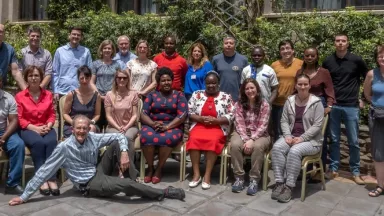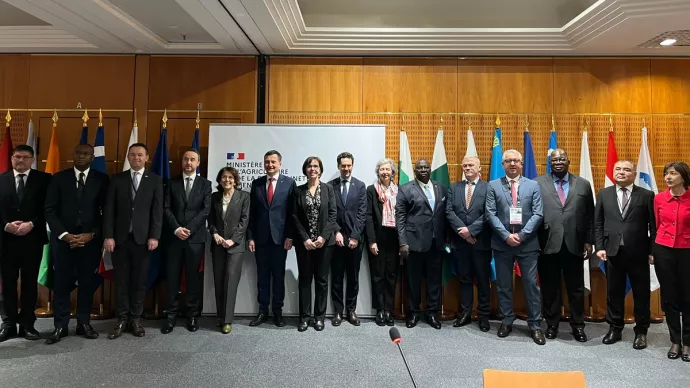
Emmanuelle Soubeyran's program
Partager la page
Emmanuelle Soubeyran's program, candidate for Director General of the World Organisation for Animal Health (WOAH).
« In line with the seventh strategic plan for 2021-2025 adopted by the World Health Assembly on 27 May 2020, after various discussions with WOAH delegates, staff and stakeholders, and in light of my experience as the Head of French Veterinary Services, my programme focuses on three main priorities. »
1. To assert WOAH leadership and its key role in global sanitary governance in addressing the issues of the 21st century
Consolidate WOAH’s core remit as a benchmark organization in animal health and welfare and raise its profile
- By ensuring transparency regarding the global health situation.
- By maintaining the security of international trade through robust standards.
- By harnessing WOAH’s expertise to develop the regulatory framework in order to better fight against major animal diseases, zoonoses and antibiotic resistance, and ensure animal welfare for all species, and by constantly striving for greater excellence in WOAH’s scientific expertise and bolstering the network of collaborating centres and reference laboratories.
- By gathering international scientific information and making it widely available, and by working on scientific communications, using modern tools to popularize and explain to as many people as possible the challenges of improving animal health.
- By promoting a world animal health day.
- By expressing positions through the publication of opinions and recommendations for various WOAH stakeholders.
Position WOAH as a key player, in coordination with other international organizations, in the face of the major challenges of the 21st century: food and nutrition security, sustainable livestock farming, pandemic prevention, climate change mitigation and adaptation, and the preservation of biodiversity
- By obtaining political recognition of WOAH as an officially established player in global health governance, as with the WTO’s SPS Agreement.
- By being systematically involved as a leading organization in all international discussions regarding Sustainable Development Goals (SDGs) relating to animal health and welfare issues (e.g. the sustainable transformation of animal production systems, antibiotic resistance, protection of the environment and biodiversity, etc.).
- By pursuing and committing to the operational capacity of partnerships with other international organizations, like the “One Health” plan launched by the Quadripartite –WHO, FAO, WOAH and UNEP – and various programmes underway worldwide.
- By being involved with the management of specialized financial instruments for these issues, such as the World Bank’s fund to prevent, prepare for and respond to pandemics.
- By continuing to advance discussions between senior staff at international organizations to bolster cross-cutting projects and by publishing joint statements and declarations regarding the health situation.
In brief
“Firstly, I shall devote all my energy to ensuring that WOAH makes its voice heard more clearly and to raising awareness of WOAH, broadening its reputation as an organisation of reference in the field of animal health and welfare. Improvements in animal health have positive consequences not only for the health of animals but also, beyond that, for food security, the economy, public health and preservation of biosecurity. This needs to be clearly understood outside livestock farming and the veterinary world by the general public and our policymakers. It is important to consolidate WOAH’s core mission decisively in order to guarantee transparency in the global sanitary situation and provide security for international commerce. And to achieve this, robust standards will be developed using WOAH’s scientific excellence and expertise, along with its networks of collaborating centres and reference laboratories. It is my wish that such a normative framework should be constructed jointly, agreed among the members and with the stakeholders, shared and disseminated, with support being provided for its implementation by its members.
Furthermore, in the face of the 21st century’s great issues – food and nutritional security, sustainable livestock farming, prevention of pandemics, combating and adapting to climate change, the preservation of biodiversity – I shall seek to win
genuine political recognition for WOAH as an established institutional actor in global sanitary governance working in coordination with other international organisations. Indeed, WOAH, as a leading organisation, must be systematically included in all international reflection on certain sustainable development goals (SDG) wherever animal health and welfare are at issue.
In this way, we must raise the profile of WOAH’s activities and those of the veterinary services all over the world.”
2. To support the national veterinary services network
Dévelop the support for implementing standards
- By giving the conditions to members in order for them to be more and better involved in the elaboration of standards.
- By stepping up the communication and dissemination of standards, for example using new digital formats (e.g. webinars, newsletters, etc.).
- By building on the network of focal points.
- By reaffirming and promoting the role of the Observatory to identify tangible obstacles and tools to properly implement standards.
- By proposing action strategies to remove obstacles to implementing standards such as the standards renewal process, communication, partnerships with veterinary training bodies and laboratories, the PVS pathway, training, drafting of advocacy for reinforcing the role of national veterinary services, and assistance for members to access funding to implement actions at their level.
- By committing to create action programmes collectively with members.
Foster collaborative and collective work for effective and responsive veterinary services
- By intensifying global initiatives such as Rabies, PPR, Foot and mouth disease, African Swine Fever, AMR, …
- By reinforcing existing networks and partnerships to discuss, anticipate and, looking beyond, collectively plan strategies and actions to monitor, prevent and combat animal diseases together.
- By improving local early alert.
- By developing socio-economic arguments to support the principle that “prevention is better than a cure”.
- By designating collaborative centers for the economy of animal health.
- By drawing on Regional Commissions and Regional and Sub-regional Representations.
- By identifying where innovation and research and development is needed to foster and guide the emergence of solutions to better anticipate, prepare for and fight against diseases, and by developing socio-economic analysis and foresight studies as decision making tools, for example.
- By bolstering links between veterinary services, universities, research institutes, international organizations and the world of veterinary and para-veterinary training.
- By encouraging public-private partnerships.
- By helping members use the guide to implement the One Health Joint Plan ofAction.
In brief
“I wish to see WOAH sharply expand support for its members in implementing standards. For this, I shall step up the communication and dissemination of standards, notably using new digital channels (webinars, newsletter, etc.) as well as by underpinning and promoting the role of the Observatory for the practical identification of the brakes and levers affecting the satisfactory application of standards, enabling more effective targeting of the policies to be developed together in close cooperation with the members’ decision makers.
This will mean that a major focus in my work will be the development of collaborative, collective efforts to ensure that all veterinary services are more efficient and more responsive. I also wish to strengthen the networks and partnerships already in place so that, together, the members in a given region or sub-region can anticipate and plan strategies and activities for the surveillance, prevention and collective control of animal diseases. The regional commissions and regional and sub-regional representations will thus be central to such reflection and collaboration and lastly, WOAH must assist its members in the pursuit of the old adage “prevention is better than cure” by producing robust, well-supported advocacy.
Reference centres will be designated for the economics of animal health.”
3. To lead WOAH in the direction of being an agile, innovative and inclusive organisation by strengthening its fundamentals
Making WOAH an organisation on the move
- By analysing the recommendations for “analysis and evaluation of WOAH’s institutional, technical, and financial governance” through a consultation process with members in order to identify and implement those which are most relevant to ensuring WOAH’s resilience.
- By pursuing the digitization work already underway and continuing to invest in digital technology and new tools, as well as big data processing to enhance health security.
- By expanding WOAH’s field of expertise to human and social sciences.
- By ensuring regional balances in WOAH’s various bodies (Comex, scientific commissions, working groups…).
- By particularly focusing on gender equality issues.
- By advocating for innovation in working methods at the organization and particularly in relation to drawing up the new 2026-2030 strategic plan.
- By testing new methods at the organization, such as project incubators or spaces focusing on innovation, to foster collective intelligence; for example, international organizations could trial a “One Health” accelerator laboratory for local applications adapted to national contexts.
- By decentralising some meetings.
- By heavily investing in the identification of new funding and active research for new sources to guarantee the organization’s independence and secure its core actions.
In brief
“I shall place all my experience and all my leadership at the service of WOAH to take it forward to become an organisation that is more agile, more innovative and more inclusive, strengthening its fundamentals and its financial levers.
From the outset, I shall work on the basis of the recommendations of the study now under way on the “analysis and evaluation of WOAH’s institutional, technical, and financial governance” using a process of consultation involving its members in order to identify the most relevant points on which to work to make WOAH more robust. We shall draw up a timetable for action.
In addition, I shall continue the work already begun on digital systems in order to equip WOAH with common tools in its different regions, and I shall also continue to invest in digital technology and new communication tools. The processing of big data to underpin sanitary security will also be an important component of my programme.
I wish to see expertise in the fields of human and social sciences supplementing WOAH’s own body of expertise. This will provide the consolidation and analytical input that are essential today.
I shall pay particular attention to the level of representation of the regions in WOAH’s various bodies, convinced as I am that decisions can only be reached with input that reflects the diversity of members’ circumstances. I shall attach great importance to gender equality issues.
And finally, I shall endeavour to make WOAH’s financial model secure so that it can continue to develop without compromise to the preservation of jobs, because I am aware that what makes WOAH strong is above all else the dedication and excellence of the women and the men it employs.”
To download / À télécharger / Descargar / للتحميل / Скачать / 去下载
Voir aussi
More Inclusivity to Strengthen the World Organisation for Animal Health (WOAH)
10 mai 2024International

Le programme d'Emmanuelle Soubeyran
25 mars 2024International
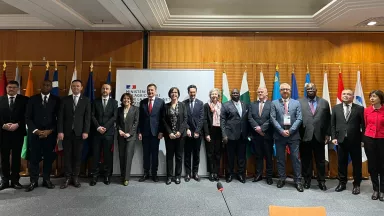
Emmanuelle Soubeyran's candidacy for the World Organization for Animal Health
29 janvier 2024International
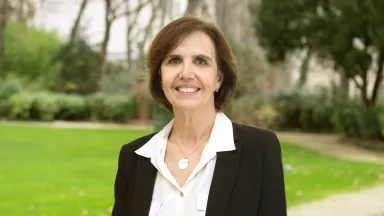
Career of Emmanuelle Soubeyran
29 janvier 2024Échanges et coopération internationale
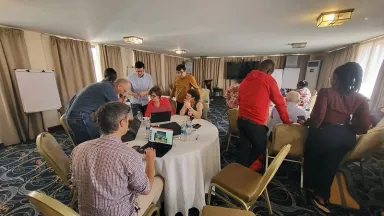
Curriculum vitæ of Emmanuelle Soubeyran
29 janvier 2024International
